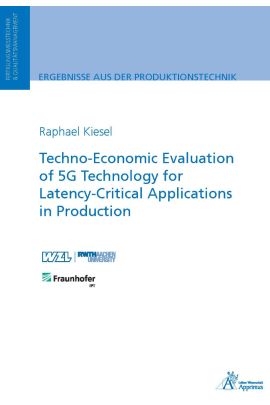Networked control systems (NCS) have been and still are main research focus in academia as well as in industry, offering several technical advantages for future production systems. These technical advantages result in cost reduction as material cost, installation, and maintenance efforts decrease, to only mention some. Key challenge for NCS in production is the communication network. It must be reliable and fulfill application’s requirements regarding maximum application-perceived latency.
5G technology is predicted to have a significant impact on the deployment of NCS in the industrial connectivity landscape. With an over-the-air latencies of 1 ms, as well as an availability and reliability of 99.999%, 5G technology outperforms current industrial wireless communication technologies. By 2030, a global GDP rise through 5G technology deployment of 4% ($740 billion) is predicted.
However, despite the immense prospected economic potential, most production companies have not deployed 5G yet or are not even planning with it. The two main concerns of production managers in terms of 5G deployment are the uncertainty regarding technical and economic potential. For both concerns, the added value of 5G technology must be evaluated to release its prospected potential in production. As no approach exists covering the requirements for a techno-economic evaluation approach, the main research question of this thesis was: Does a model-based approach enable the evaluation of 5G technology potential for latency-critical applications in production?
The goal of this thesis therefore lays in the conceptualization, development, implementation, as well as verification and validation of a techno-economic evaluation approach for the 5G deployment for latency-critical applications in production.
This was achieved in form of a five-step evaluation model quantifying both the technical and economic benefits of 5G technology deployment for the latency-critical applications in production. The model was implemented in a browser-based tool to enable an applicability, as well as verification and validation. Verification and validation were executed based on two case studies (AGV, milling machine) and expert reviews - forming a basis for further research in the context of 5G technology in production.
| Autor | Kiesel, Raphael |
|---|---|
| Gewicht | 0.346 kg |
| Erscheinungsdatum | 19.10.2022 |
Fertigungsmesstechnik und Qualitätsmanagement
Techno-Economic Evaluation of 5G Technology for Latency-Critical Applications in Production
Kurzbeschreibung
By 2030, a rise of 4% of global GDP of production industry is expected through 5G deployment. Despite the immense potential, many companies are not planning to deploy 5G yet, mainly due to concerns regarding technical and economic potential of 5G deployment. To enable an ex-ante evaluation of 5G-deployment in production, a five-step model was developed, verified and validated in this thesis, enabling the techno-economic evaluation of 5G deployment for latency-critical applications in production.

